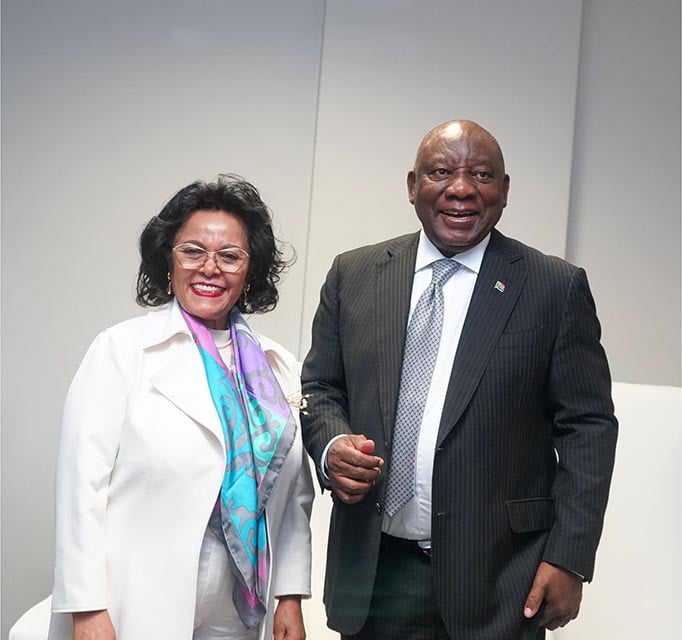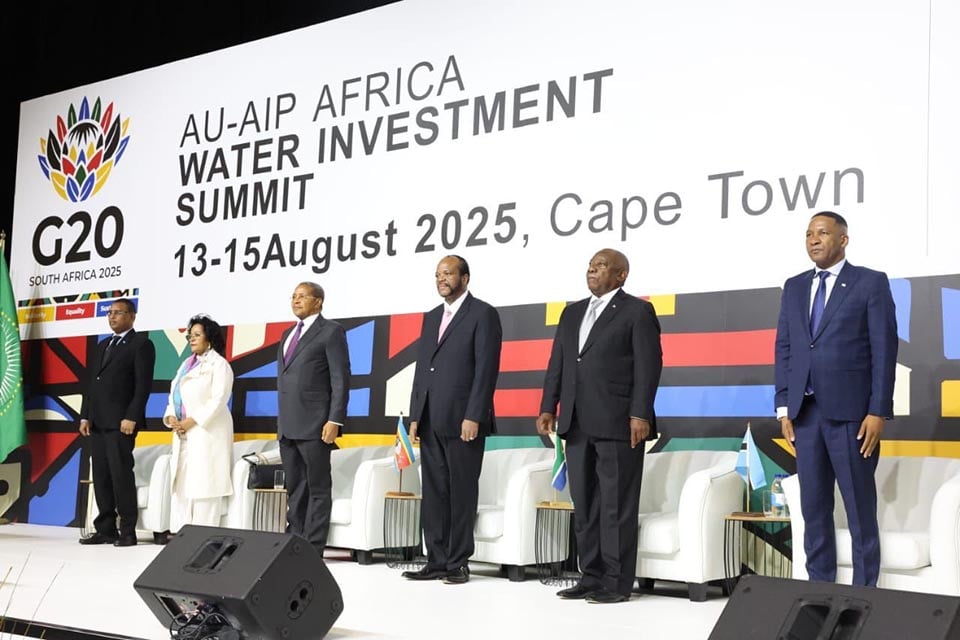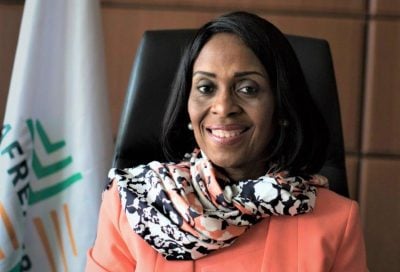Speaking at the AU-AIP Africa Water Investment Summit in Cape Town, AUDA-NEPAD CEO H.E. Nardos Bekele-Thomas delivered a compelling case for treating water as critical economic infrastructure while proposing the appointment of a Presidential Champion to accelerate universal water access across Africa.
Bekele-Thomas, who was appointed by President Ramaphosa to serve as Champion of the Global Outlook Council on Water Investment alongside other heads of state and eminent persons from around the world, expressed her appreciation for the honor during her address.
The summit, hosted by South African President Cyril Ramaphosa in his capacity as G20 Chair, brought together heads of state and development partners to address Africa’s pressing water crisis ahead of the African Union’s designation of 2026 as the Year of Water and Sanitation.
A crisis of scale and opportunity
Bekele-Thomas painted a stark picture of Africa’s water reality: over 300 million people lack clean drinking water, while 700 million lack adequate sanitation. This crisis extends far beyond public health, constraining economic growth, educational opportunities, and gender equity across the continent.
The financial dimensions are equally sobering. Africa needs $50 billion annually to meet water security goals by 2030, yet current investments hover between $10-19 billion. This gap contributes to losses of up to $200 billion per year from climate impacts and inefficiencies—a sum that underscores the economic imperative for action.
“Water is a vital resource, it is the source of life,” Bekele-Thomas emphasised. “Discussions about water are fundamentally a matter of sovereignty, dignity, and the economic survival of Africans.”
From social good to economic infrastructure
The AUDA-NEPAD chief executive outlined three critical areas requiring immediate attention, beginning with a fundamental shift in how Africa conceptualises water resources.
“We must treat water as critical economic infrastructure, not just a social good,” she argued, citing recent examples that demonstrate water’s direct impact on economic performance.
In 2024, Zambia’s Kariba Dam dropped to just 2.34% of usable storage, triggering power blackouts that disrupted mining operations and slowed economic activity. Meanwhile, Lake Chad’s surface area has shrunk by 90% since the 1960s, contributing to the multifaceted crisis affecting the Sahel region.
Bekele-Thomas called for integrating water management into regional value chains, linking transboundary river basins with energy corridors and agro-industrial zones. “The message to our partners is clear: investing in water is a prerequisite for Africa’s industrial future,” she stated.

Building bankable solutions
The second pillar of AUDA-NEPAD’s strategy focuses on translating commitments into deliverable, financially viable projects. Bekele-Thomas noted that the challenge often lies not in money availability but in the gap between available liquidity and bankable financing opportunities.
AUDA-NEPAD has already made significant progress in this area, working with summit stakeholders to develop a pipeline of 80 water and sanitation projects across 38 countries, valued at $32 billion. Among these are several Presidential Infrastructure Champion Initiative (PICI) and PIDA PAP 2 projects, including:
– The Lake Victoria Mediterranean Sea Navigational Line (VICMED), championed by Egypt
– The Lesotho-Botswana Water Project
– The Angololo Water Resources Development Project spanning Kenya and Uganda
– The Noordoewer Vioolsdrift Dam project between Namibia and South Africa
“This is concrete, impact-oriented pipeline, and we need to take them forward and translate them into infrastructure and services for the betterment of African citizens’ lives,” Bekele-Thomas declared.
Systemic change for universal access
The third element of AUDA-NEPAD’s approach emphasizes moving beyond individual projects toward building sustainable systems. This includes operationalizing performance-based grant schemes to attract private capital, expanding digital monitoring systems, and deepening utility reforms.
Bekele-Thomas stressed the importance of accountability, citing tools like the AIP Water Investment Scorecard to track progress toward universal access goals.
A Presidential Champion for 2026
Building on these strategic foundations, Bekele-Thomas concluded with a concrete proposal that could reshape Africa’s approach to water governance. She called for the appointment of a Presidential Champion for Affordable, Reliable, and Accelerated WASH Access in Africa, working within the PICI framework.
This champion would spearhead high-level political engagement, ensuring advocacy, peer accountability, and alignment across health, education, finance, and water sectors to close the investment gap and accelerate universal access by 2030.
“Past ministerial commitments, while well-intentioned, have not always yielded sufficient results,” she noted, emphasizing the need for top-level political engagement to drive systemic change.
The proposal comes at a crucial juncture, with the 2026 African Union Year of Water and Sanitation providing what Bekele-Thomas termed “a historic opportunity” to transform commitments into tangible results for African citizens.
As Africa grapples with the intersection of climate change, economic development, and social equity, AUDA-NEPAD’s call for treating water as economic infrastructure rather than merely a social good represents a significant shift in thinking—one that could determine whether the continent’s water challenges become catalysts for growth or continued constraints on its development aspirations.
The AU-AIP Africa Water Investment Summit continues to serve as a platform for continental leaders to align strategies and commitments toward achieving universal water access by 2030, with South Africa’s leadership providing crucial momentum for the ambitious 2026 targets.
Want to continue reading? Subscribe today.
You've read all your free articles for this month! Subscribe now to enjoy full access to our content.
Digital Monthly
£8.00 / month
Receive full unlimited access to our articles, opinions, podcasts and more.
Digital Yearly
£70.00 / year
Our best value offer - save £26 and gain access to all of our digital content for an entire year!

 Sign in with Google
Sign in with Google 



